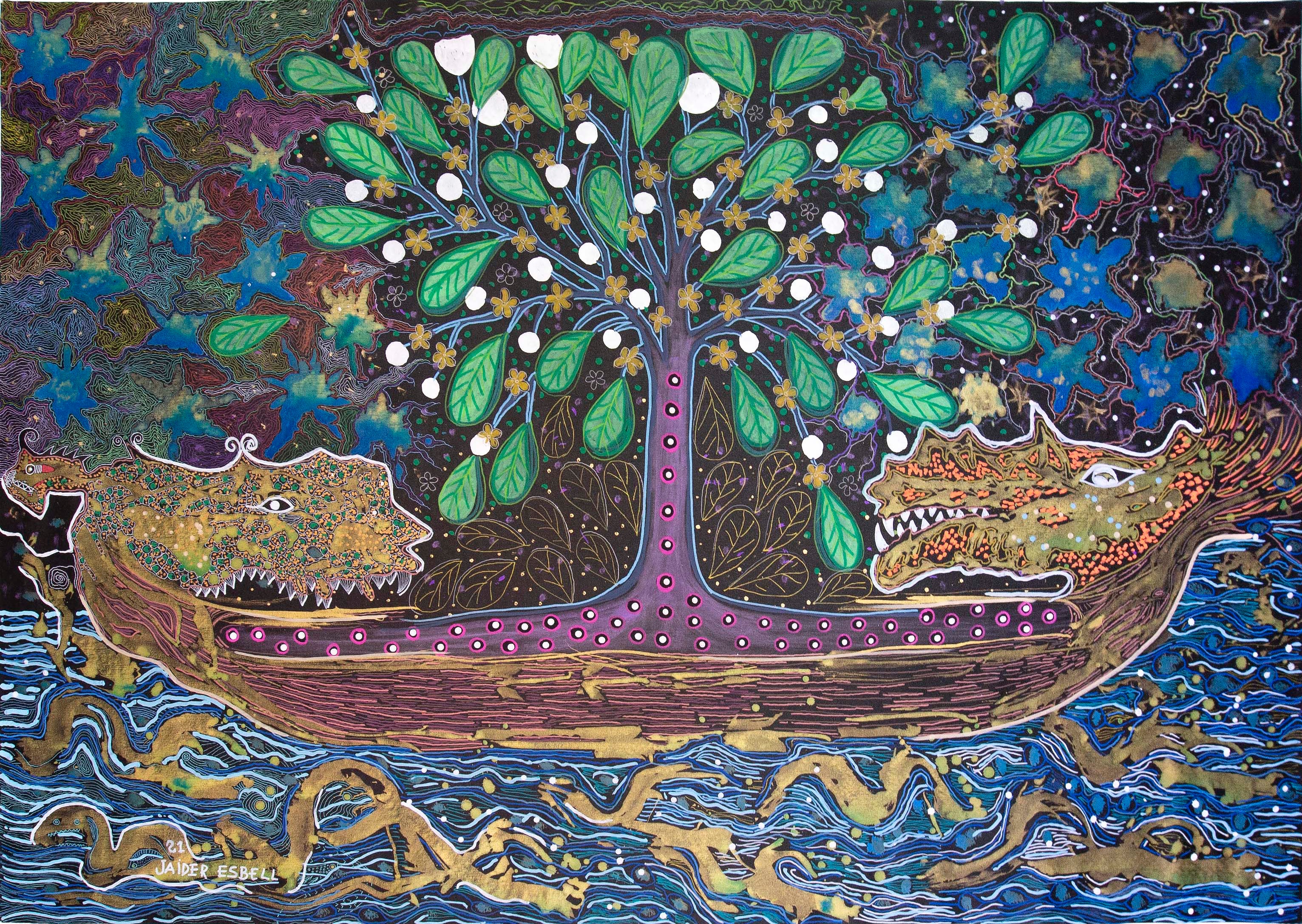‘The Royal Road to the Colonial Unconscious’: Psychoanalysis, Cannibalism, and the Libidinal Economy of Colonialism
Main Article Content
Abstract
In this article, I explore the libidinal economy of colonialism from the perspective of cannibalism (as Western fantasy about the exotic, subhuman other). To do that, I closely follow references to the cannibal in the arsenal of anti-colonial, literary tropes and, in two poems by Oswald de Andrade and Aimé Césaire. Although the anti-colonial identification with the cannibal engenders the potential of a threatening reappropriation of that which has been colonially stolen, I show that something is left unacknowledged in this melancholic identification. I then turn to the work of Octave Mannoni who views the cannibal as a metaphor for the overwhelming dependency complex of the colonised. Analysing the colonial dyad from the perspective of personality complexes, Mannoni fixes the coloniser and the colonised in a power dynamic, which although addresses the psychological dimension of colonialism this is reduced to the level of an interpersonal conflict. Finally, I turn to the work of Frantz Fanon to show what a psychoanalytic reading of the colonial, libidinal economy can offer: emphasising the sexual connotations enclosed in the cannibalistic fantasy, Fanon exposes the viscerality of colonial racism as a wish
to devour and annihilate the colonised. In Fanon’s work, psychoanalysis emerges as a potent tool which exposes the unconscious dynamics of sexualised and racial fantasies and as such it appears to be an indispensable for decolonial thinking.
Article Details
Section

This work is licensed under a Creative Commons Attribution-NonCommercial 4.0 International License.
Authors who publish in this journal agree to the following terms:
Authors maintain the copyright and grant the journal the right of first publication, the work being simultaneously licensed under the Creative Commons Attribution License which allows the sharing of the work with recognition of the authorship of the work and initial publication in this journal.
Authors are authorized to take additional contracts separately, for non-exclusive distribution of the version of the work published in this journal (eg publish in institutional repository or as a book chapter), with acknowledgment of authorship and initial publication in this journal.
Authors are allowed and encouraged to publish and distribute their work online (eg in institutional repositories or on their personal page) at any point before or during the editorial process, as this can generate productive changes as well as increase the impact and the citation of the published work.
How to Cite
References
Andrade, Oswald de. “Canibalist Manifesto.” Translated by Leslie Bary. Latin American Literary Review 19, no. 38 (1991): 38–47.
Arens, Walter. The Man-Eating Myth. 1st ed. New York: Oxford University Press, 1979.
Barker, Francis, Peter Hulme, and Margaret Iversen. Cannibalism and the Colonial World. New York: Cambridge University Press, 1998.
Bhabha, Homi K. “Of Mimicry and Man: The Ambivalence of Colonial Discourse.” The MIT Press, October, 28, no. Discipleship: A Special Issue on Psychoanalysis (Spring 1984): 125–33.
Biber, Katherine. “Cannibals and Colonialism.” Sydney Law Review 26, no. 4 (2005): 623–37.
Bonaparte, Marie. Female Sexuality. Translated by John Rodker. New York: Grove Press, 1953.
Césaire, Aimé. Notebook of a Return to My Native Land. Translated by Mireille Rosello and Annie Pritchard. Newcastle-upon-Tyne: Bloodaxe Books, 1995.
Césaire, Aimé. . The Original 1939 Notebook of a Return to the Native Land. Translated by John Eshleman and James A. Arnold. Connecticut: Wesleyan University Press, 2013.
Davis, Gregson. Aimé Césaire. Cambridge UK: Cambridge University Press, 1997.
Fanon, Frantz. Black Skin, White Masks. 2nd ed. London: Pluto Press, 1986.
Fanon, Frantz. “The ‘North African Syndrome.’” In Toward the African Revolution: Political Essays, translated by Haakon Chevalier, 3–16. New York: Grove Press, 1967.
Gibson, Nigel. “Thoughts about Doing Fanonism in the 1990s.” College Literature 26, no. 2 (1999): 96–117.
Gilroy, Paul. The Black Atlantic: Modernity and Double Consciousness. London: Verso, 1993.
Hook, Derek. A Critical Psychology of the Postcolonial: The Mind of Apartheid. London and New York: Psychology Press, 2012.
Hook, Derek. “Fanon and Libidinal Economy.” In Re(Con)Figuring Psychoanalysis: Critical Juxtapositions of the Philosophical, the Sociohistorical and the Political, edited by Aydan Gülerce, 164–84. New York and London: Palgrave Macmillan, 2012.
Hulme, Peter. Colonial Encounters: Europe and the Native Caribbean, 1492-1797. London: Methuen, 1986.
Khanna, Ranjana. Dark Continents: Psychoanalysis and Colonialism. Durham and London: Duke University Press, 2003.
Kilgour, Maggie. From Communion to Cannibalism: An Anatomy of Metaphors of Incorporation. New Jersey: Princeton University Press, 1990.
Lane, Christopher. “Psychoanalysis and Colonialism Redux: Why Mannoni’s ‘“Prospero Complex”’ Still Haunts Us.” Journal of Modern Literature 25, no. 3/4 (2002): 127–49.
Lauretis, Teresa de. “Difference Embodied: Reflections on Black Skin, White Masks.” Parallax 8, no. 2 (2002): 54–68.
Lebeau, Vicky. “Children of Violence.” In Black Skin, White Masks: New Interdisciplinary Essays, edited by Max Silverman, 128–45. Manchester and New York: Manchester University Press, 2005.
Madureira, Luís. Cannibal Modernities: Postcoloniality and the Avant-Garde in Caribbean and Brazilian Literature. U.S.A: University of Virginia Press, 2005.
Mannoni, Octave. Prospero and Caliban: The Psychology of Colonization. Translated by Pamela Powesland. London: Methuen & Co, Ltd, 1956.
Mannoni, Octave. “The Decolonisation of Myself.” Race VII, no. 4 (1966): 327–35.
Mbembe, Achille. “The Society of Enmity.” Radical Philosophy, 1, no. 200 (2016): 23–235.
McCulloch, Jock. Black Soul White Artefact: Fanon’s Clinical Psychology and Social Theory. London and New York: Cambridge University Press, 1983.
Obeyesekere, Gananath. Cannibal Talk: The Man-Eating Myth and Human Sacrifice in the South Seas. U.S.A: University of California Press, 2005.
Sadlier, Darlene J. Brazil Imagined: From 1500 to the Present. Austin, Texas: University of Texas Press, 2008.
Schwarz, Roberto. “Brazilian Culture: Nationalism by Elimination.” Translated by Linda Briggs. New Left Review I, no. 167 (1988): 77–90.
Walton, Jean. Fair Sex, Savage Dreams: Race, Psychoanalysis, Sexual Difference. Durham and London: Duke University Press, 2001.
Wilder, Gary. Freedom Time: Negritude, Decolonization and the Future of the World. Durham and London: Duke University Press, 2015.

